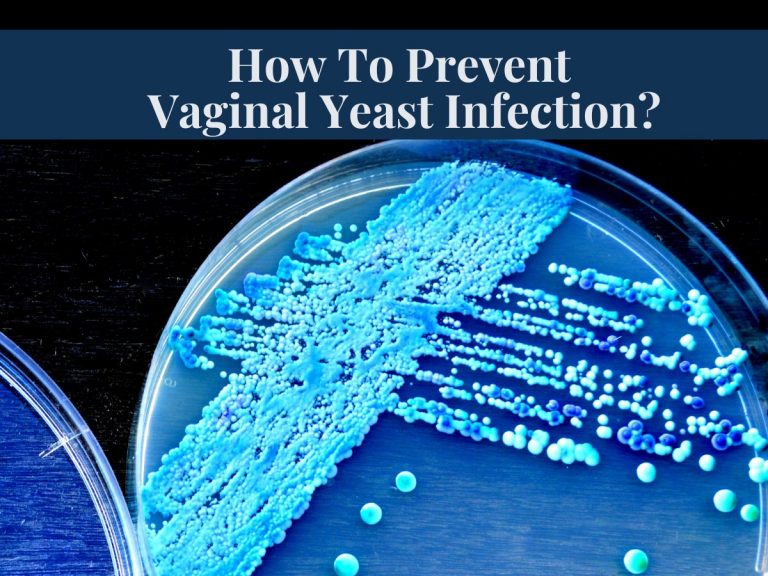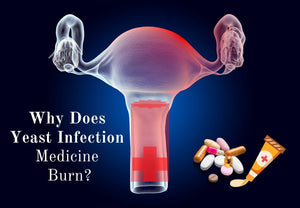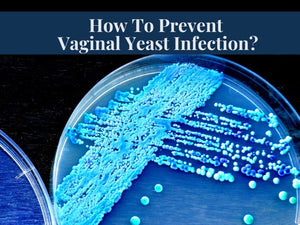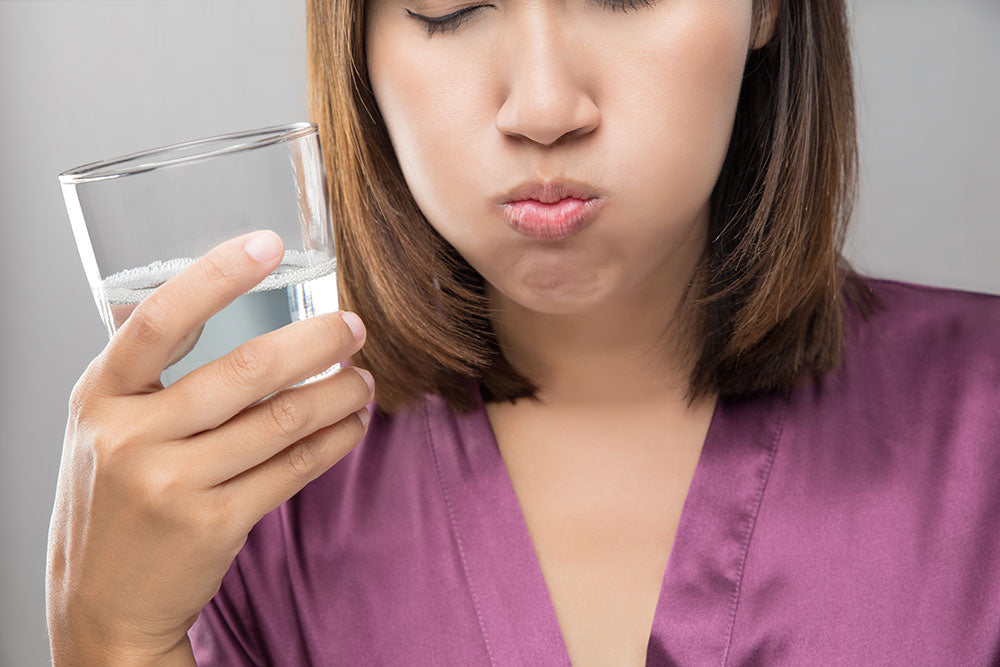Vaginal yeast infections, also known as Vulvovaginal Candidiasis, are caused by a common yeast specie, Candida albicans. According to several scientific evidence and studies, about 75 percent of women encounter yeast infections once in their lifetime. Amongst them, the incidence of recurrent vaginal yeast infections is high at about 45 percent. Since vaginal yeast infections are so common worldwide, it\’s crucial to learn how to prevent vaginal yeast infections. The following description concerns preventing vaginal yeast infections through dietary and lifestyle changes that are quite easy and affordable to adopt and adhere to.

Vaginal Yeast Infections: Symptoms
Usually, Candida thrives on human skin, but due to some unfavorable conditions and unhygienic practices, these microflorae become pathogens. Candida albicans feed on sugars and replicate rapidly, causing symptoms. These include:
- Vaginal pain
- Vaginal irritation and itchiness
- Redness and swelling of the vagina and vulva
- Burning sensation while urinating and during sex
- Watery or thick white cottage cheese-like discharge with no odor (odor may be yeasty in some cases)
Causes And Risk Factors:
Though the most common causative agent of vaginal yeast infections is Candida albicans, in some patients, treatment-resistant yeast infection is also caused by other Candida strains, such as Candida glabrata and Candida krusei. Secondary causes or the risk factors that cause this virulent strain to proliferate are:
- A weakened immune system that is no longer fortified to fight against microbes can increase the risk of vaginal yeast infections. Immunocompromised people are infected and sick with HIV/AIDS, Hepatitis virus, cancer, and malignancies.
- People who suffer from chronic metabolic diseases such as diabetes and obesity are more prone to vaginal yeast infections compared o healthy individuals.
- Taking antibiotics or immunomodulators for a prolonged period can kill the healthy gut microbes protecting our body from virulent strains, thereby increasing the incidence of yeast infections.
- Pregnant females, those taking birth control pills, and those with hormonal imbalance issues can get vaginal yeast infections more readily than non-pregnant females with normal hormonal balance.
- Females who frequently use douches, feminine-scented products, contraceptive devices, and agents are susceptible to vaginal yeast infections.
How To Prevent Vaginal Yeast Infection?
If you don’t have a yeast infection or have had a yeast infection and want to prevent its recurrence, you should know how to prevent vaginal yeast infections. For this purpose, you should make dietary changes and alterations in your lifestyle.
Dietary Changes
Dietary changes to prevent and cure vaginal yeast infections include consuming ample probiotics to replenish the good gut microflora. Moreover, you should take a diet with adequate proteins, complex carbohydrates, good cholesterol, vitamins, and minerals that give the body vigor and fortify the immune system to fight against yeast infection.
Probiotics
The reduction in good protective microflora on our body makes the condition favorable for the yeast to invade and replicate rapidly. Therefore, probiotics can replenish these good bacteria in our bodies to fight against such virulent strains. You can eat plain Greek Yogurt with no added sugar as the best natural and dairy product to add probiotics to your diet. Moreover, people with lactose intolerance can also eat yogurt due to less lactose and high probiotic content. You can also consume the curd with added live bacterial cultures.
Nevertheless, you can try other probiotic sources and supplements if you prefer something other than eating Greek yogurt. Such natural and fermented sources include kombucha, kimchi, sauerkraut, and kefir. Furthermore, formulated probiotic supplements include lactobacillus rhamnosus, bifidobacterium longum, lactobacillus acidophilus, bifidobacterium infantis, lactobacillus casei, Streptococcus thermophilus, and many others.
Proteins
A balanced diet always includes a portion of proteins to give the body several health benefits. These benefits are improved muscle mass, reduced blood sugar levels, and a general increase in vitality. As a result, all these advantages help a body better fight and prevent vaginal yeast infections. Therefore, include the recommended amount of chicken, red meat, and fish.
Complex Carbohydrates
Complex carbohydrates include whole grains high in fiber and help maintain blood sugar levels. These include barley, oats, millet, brown rice, buckwheat, quinoa, teff, and Kamut. Moreover, complex carbs help digest food easily and reabsorb maximum nutrients from GIT to blood to nourish body cells and maintain a quality life.
Good Fats
It is also crucial to consume good fats and cholesterol because these are the best source of omega-3 fatty acids. Omega 3 fatty acids help manage many autoimmune and malignant diseases, such as rheumatoid arthritis and cancer. Moreover, these good fats provide the body with energy and have a satiety value to regulate meal intake and maintain normal body weight. It is particularly effective since obesity increases the incidence of vaginal yeast infections and omega-3 fatty acids maintain BMI (body mass index) and healthy body weight. Furthermore, sources of good fats include olive oil, coconut oil, fish oil, sunflower oil, avocados, chia seeds, and flax seeds.
Vitamins And Minerals
The best natural sources of vitamins and minerals are fruits and vegetables. Consume the recommended amount of such foods daily and take particular precautions if you have diabetes and are eating fruits for vitamins since fruits contain glucose and fructose. Moreover, eat vegetables in moderation because many have high starchy content.
Contribution Of Vitamin B Complex In Preventing Vaginal Yeast Infection
According to research conducted on mice to evaluate the contribution of Vitamin B complex in potentiating the effects of fluconazole, vitamin B complex enhances the curative effects of fluconazole. Therefore, it is hypothesized that taking B vitamins in recommended amounts in our daily routine can help us prevent vaginal yeast infections,
What Types Of Foods Should You Avoid?
- Avoid taking sugars since an increase in glucose content will favor yeast growth. Therefore, do not consume sugary products like candies, chocolates, honey, maple syrup, agave, molasses, cream, beverages, and canned foods; take fruits and vegetables in moderation.
- Replace simple carbohydrates with complex ones since simple carbs metabolize to glucose, increasing blood sugar and urine sugar. Therefore, avoid consuming too many foods like white rice, wheat, and bakery loaves of bread.
- Foods that contain fungi, such as yeast, mold, and mushrooms, should be avoided to prevent vaginal yeast infections. Yeast is used for fermenting and preparing different foods, such as beverages, soy sauce, and dressings like mayonnaise, mustard, and bakery goods. Moreover, mold may be present in nuts, cheese, and pickles. Also, mushrooms are fungi to avoid to prevent yeast proliferation.
- Avoid taking refined oils such as soybean, canola, and margarine.
Also Read: What Happens If A Yeast Infection Goes Untreated? Complications And Mangement
Lifestyle Modifications
Make certain changes in your lifestyle to avoid and prevent vaginal yeast infections. These are:
Hygiene
Maintain proper hygiene, take a bath regularly, and after having intercourse. Moreover, wipe from front to back, wash the genital area using mild and chemical-free products, and dry it completely before putting on clothes. Since warm and damp surfaces are the best homes for yeast. Also, avoid taking too many hot baths. During periods, it\’s crucial to maintain hygiene, change your sanitary pads every two to four hours, and avoid using tampons since they can easily transmit yeast infection.
Role Of Clothing
Clothing plays an important role in vaginal yeast infections. Cotton is the best fabric since it does not hold moisture and warmth, favorable conditions for yeast overgrowth. Always wear loose-fitting leggings, stockings, swimsuits, and yoga pants to avoid raising the temperature of underneath legs. Moreover, change your wet clothes after swimming and beach activities and prefer nightgowns over silk pajamas. Do not share your bathroom linen with an infected person to prevent vaginal yeast infections.
Avoiding Feminine Products And Devices
Do not use feminine-scented products too much, and do not douche since it can flush away the good bacteria helpful in maintaining acidity inside the vagina. Also, avoid using contraceptive devices such as diaphragm or IUDs to prevent reexposure and recurrence of vaginal yeast infections. Do not share your hygiene products and devices, such as razors, with an infected person.
Managing Health Conditions
To prevent vaginal yeast infections, you should manage the health conditions such as diabetes, hepatitis, and obesity that increase the incidence of such infections. Moreover, during pregnancy, one can consult the doctor for an appropriate diet and lifestyle changes to avoid recurrent vaginal yeast infections. A female with a hormonal imbalance should manage this underlying cause first to prevent candidiasis. In a nutshell, maintain normal body weight, blood sugar levels, and hormonal balance to avoid yeast infections.
Outlook
Vaginal yeast infections though common, are quite easy to prevent. For this very purpose, you should make minor changes in your diet and lifestyle. It\’s not specific that a person who has had a vaginal yeast infection should follow the abovementioned preventions and precautions to avoid subsequent reactivation of infection. Rather, any individual with the above medical concerns or who is reaching puberty can adopt these lifestyle modifications to prevent yeast infections all their life. Moreover, natural remedies and supplements are quite affordable and accessible. Not only do these measures help you avoid yeast infections, but they also aid you in maintaining healthy body weight, revitalizing, and improving your quality of life.
Also Read: What Is The Difference Between A UTI And Yeast Infection?













